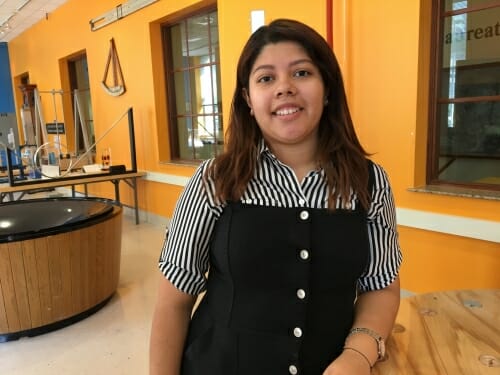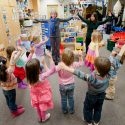New campus-wide effort provides coordinated training for hundreds of peer tutors
Before ever setting foot in an Intro to Physics class, Alejandra Torres Diaz signed up for peer tutoring through the Physics Learning Center on campus.
She didn’t necessarily think she’d struggle in the class, but she figured an upperclassman’s insights could only help.
“I mean, why not have that extra support?” asks Torres Diaz, who was a junior at the time.

Senior Alejandra Torres Diaz, pictured at the Physics Museum on campus, received peer tutoring assistance last year and is now a tutor herself. “I love being in this position of helping others realize that they’re capable, that they can do this, and that they can have fun while doing it.” Photo by Doug Erickson
She did very well in the class, and now, a year later, she’s a peer tutor herself at the center, part of the Department of Physics. Sunday, she was among nearly 250 UW–Madison peer tutors who took part in a campus-wide training at the Gordon Dining and Event Center.
Peer tutors are high-performing students who provide academic help to fellow students. It’s a widely-researched approach that provides academic and social development benefits for both the tutor and the tutee. At UW–Madison, the tutoring is free.
Sunday’s gathering, called the Tutor Development Conference, is itself relatively new, held for the first time last fall and again in the spring. It’s an economies-of-scale effort, designed to pool resources by bringing together the hundreds of peer tutors spread across campus for a coordinated, collaborative afternoon of training.
“It’s so much more efficient to have 250 tutors hear one high-quality speaker than for each of us to try to replicate something like that individually,” says Bob Wiedenhoeft, who helped organize the training as an instructional support specialist and advisor with the Center for Academic Excellence.
Numerous units on campus provided funds and support to sponsor the training. UW–Madison appears to be at the forefront in using the approach, says Scott Seyforth, an assistant director of residence life. When he mentioned at a national conference two years ago that UW–Madison soon would be offering coordinated, campus-wide training for peer tutors, his Big Ten peers deemed it unusual, he says.
Sunday’s keynote speaker was Gloria Ladson-Billings, a renowned professor emerita of curriculum and instruction and a national expert on what is called “culturally relevant teaching.” Students spent the remainder of the afternoon in break-out sessions.
UW–Madison has a long history of using peer tutors and takes a decentralized approach. There are hundreds of peer tutors spread across schools, departments, residence halls and student organizations. An exact figure isn’t known, and the number constantly fluctuates based on need, Wiedenhoeft says.
The entities with the largest number of peer tutors at Sunday’s training were, in descending order: the Undergraduate Learning Center in the College of Engineering; the Division of Diversity, Equity and Educational Achievement; University Housing; the Center for Academic Excellence; the Physics Learning Center; and the Greater University Tutoring Service (GUTS).
Some peer tutors are paid, others are volunteers. Sometimes the tutoring occurs in groups, other times one-to-one.
“We want people who will connect with students on a personal level and who will create a good group dynamic and be compassionate about the variety of ways students learn.”
-Amihan Huesmann
The Physics Learning Center employs up to 20 paid peer tutors each year and uses the group approach. A prospective hire must be well-versed in physics, but need not be a physics major or have a perfect grade point average, says Amihan Huesmann, a faculty associate and staff member of the center.
“It’s important to know physics, but it’s not everything,” she says. “We want people who will connect with students on a personal level and who will create a good group dynamic and be compassionate about the variety of ways students learn.”
There’s significant value in a student receiving help from a peer, says Amihan, who has a Ph.D. in physics.
“This is someone they can relate to, someone who just recently had the same experience as they did in that same classroom,” she says. “I can’t tell you the number of times I’ve learned from one of our peer tutors how to better explain a complicated concept to a student.”
Torres Diaz, a senior biology and Spanish major from Clarksburg, Maryland, says her experience in a peer tutoring group helped her immensely.
“I was provided with a lot of extra material so that I could practice the concepts we were learning in class,” she says. “While a lot of that kind of information can be found online, peer tutors know how to filter it. They know exactly what your professor wants you to learn.”
More broadly, Torres Diaz says the tutoring helped her determine the kind of learning approaches that work best for her — a skill that has helped her in other classes.
“There’s this misperception that if you’re asking for help, you’re struggling, and that’s not necessarily true,” she says. “Any extra resource like this can be really pivotal in making sure your college experience is successful.”
Students interested in signing up for peer tutoring or being a peer tutor can start researching options at advising.wisc.edu/tutoring.
Tags: academics, curriculum, engineering



